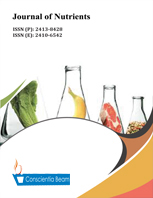Vitamin D Supplementation Practices in Pregnancy and During Infancy and Other Behaviors Related to Vitamin D Status among a Sample of Muslim Women in Ireland and Saudi Arabia
DOI:
https://doi.org/10.18488/journal.87/2015.2.1/2015.1.11.26Abstract
Objectives (background): Requirement for Vitamin D is high at particular stages of the lifecycle especially during pregnancy and infancy. Severe vitamin D deficiency during pregnancy may increase the risk of rickets in childhood. While policies exist in Ireland regarding supplementation of Vitamin D in either pregnancy or infancy, no policy recommendation exists in Saudi Arabia. The main aim of this study was to identify attitudes towards Vitamin D supplementation as well as its prevalence in pregnancy and infancy among Muslim mothers living in Ireland and in Saudi Arabia. Methods: A quantitative cross-sectional survey consisting of 121 Muslim mothers living in Saudi Arabia and 77 Muslim women living in Ireland. Recruitment of mothers took place in three hospitals in Makkah (Saudi Arabia Al-Noor Hospital, Hera'a Hospital and Maternity and Children's Hospital) and a religious Centre in Ireland between June and September 2012. Results: Only 28.6% of the Irish and 7.4% of the Saudi mothers had taken vitamin D supplements during their pregnancy. While 62.3% of the Muslim mothers in Ireland and 37.2% in Saudi Arabia were aware of the recommendation to give a daily vitamin D supplements to their infants until they were one year of age just 49.4% living in Ireland and 13.2% from Saudi Arabia did so. While a majority of mothers living in Ireland and Saudi Arabia were spending > 30 minutes a day outside, clothing that completely cover the body was worn by the entire sample, sunscreen was used by 44.2% in Ireland and 53.7% in Saudi Arabia. Conclusion: Poor vitamin D supplementation practices are evident among Muslim mothers and infants both in Ireland and Saudi Arabia. To improve this situation, mothers should be educated about the importance of vitamin D during pregnancy and infancy.

